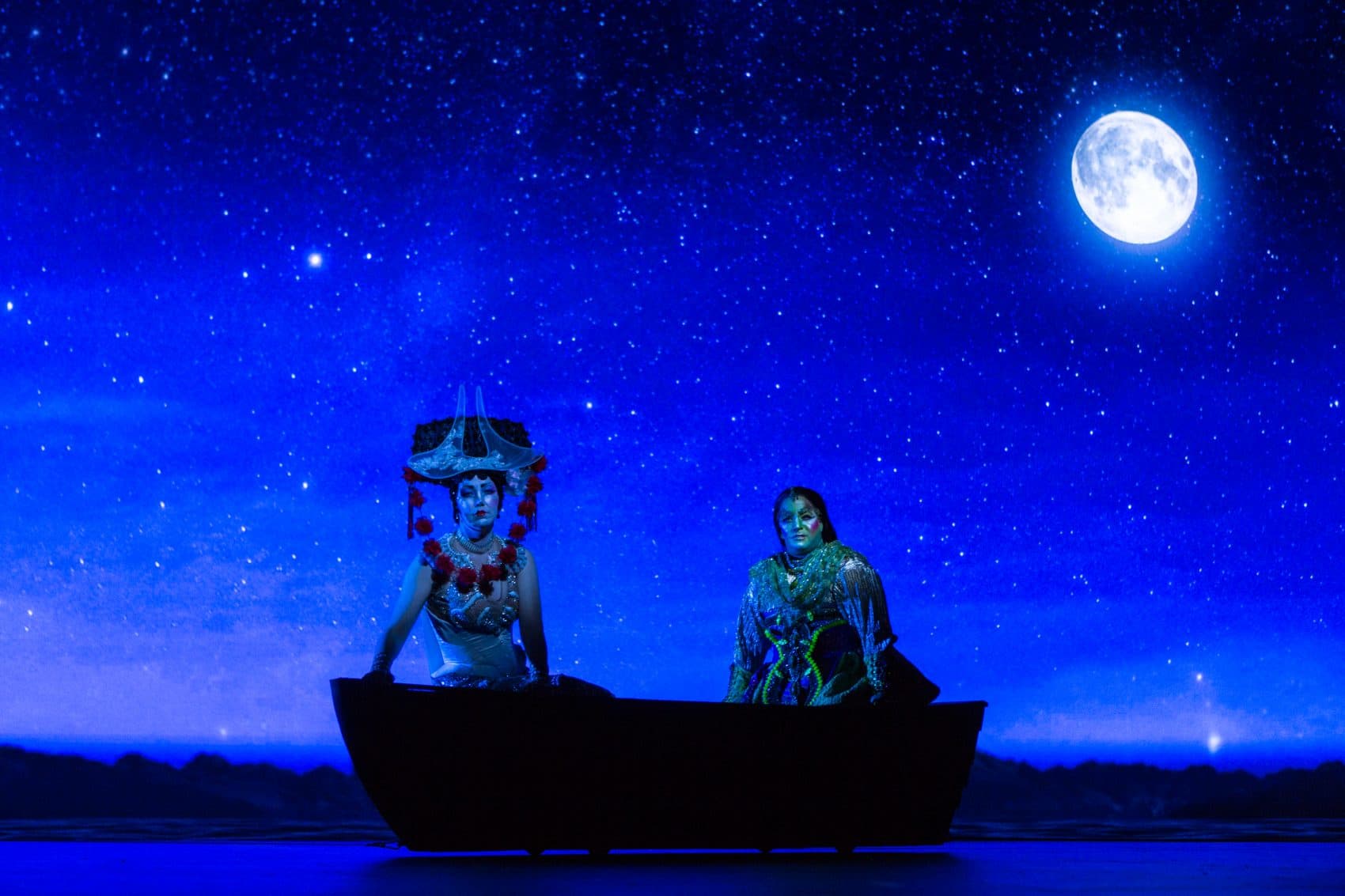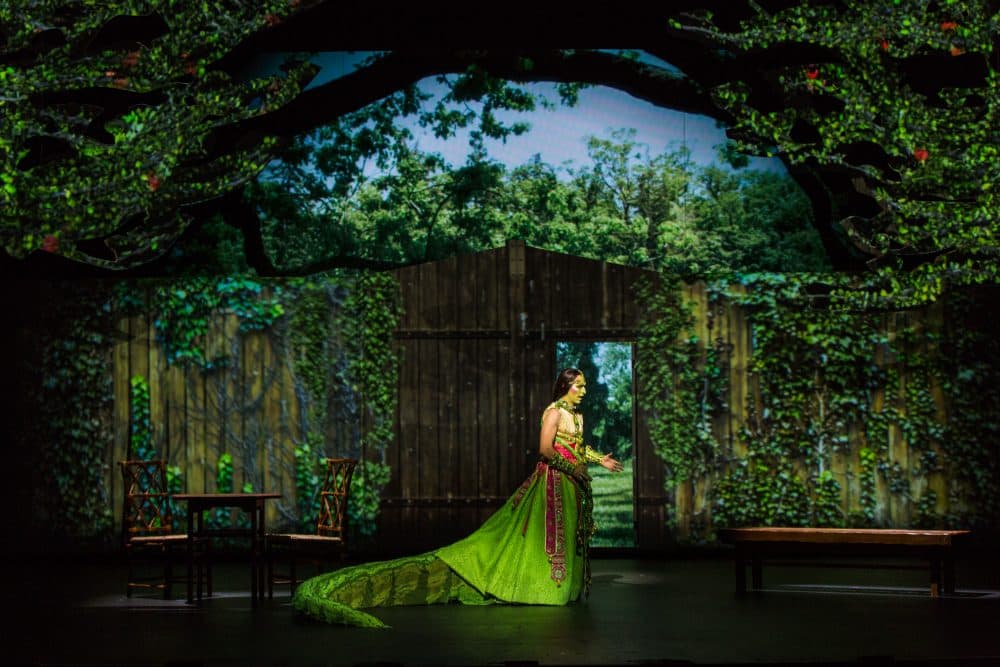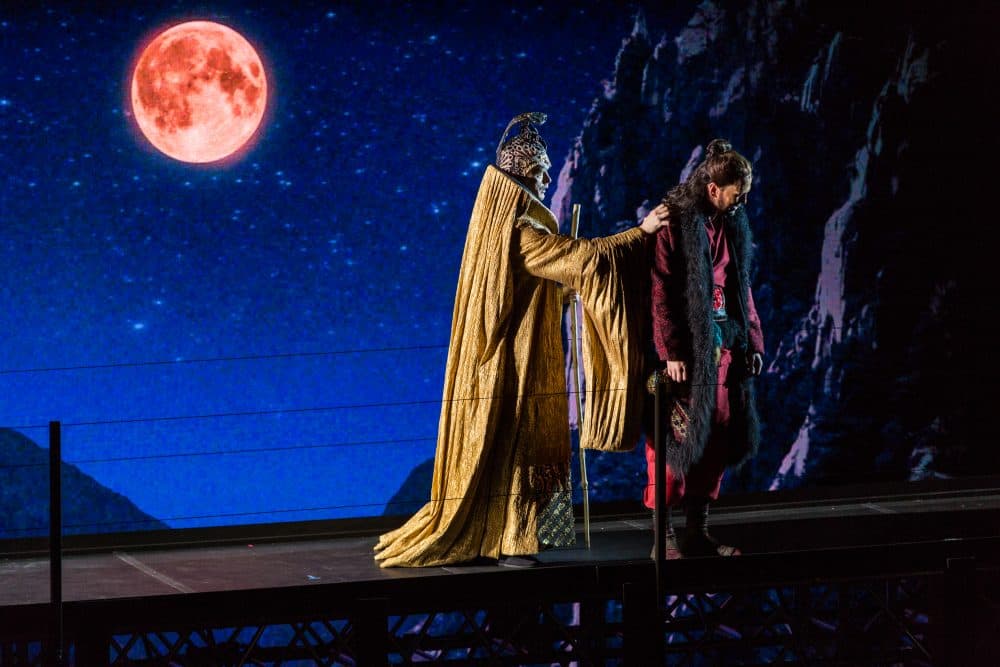Advertisement
An Ambitious Marathon, 'Ouroboros Trilogy' Brings Operatic Innovation To Boston

Boston opera hasn’t seen an event like this in a long while — if ever.
The ambitious "Ouroboros Trilogy" opened Saturday at the Cutler Majestic Theatre. Ouroboros featured three different composers, three different conductors, an international team of staging innovators and a rotating cast with some of the best young singers and choristers anywhere — all brought together through the vision of librettist and producer Cerise Lim Jacobs.
There were many outstanding moments of innovation and artistry during Saturday’s marathon, which began in the morning with “Naga,” had a mid-afternoon staging of “Madame White Snake” and concluded in the evening with “Gilgamesh.” There were plenty of misses as well.
“Naga,” with Scott Wheeler’s score and Carolyn Kuan conducting, set the trilogy in motion. An engaging but often overwhelming amalgam of sight and sound, “Naga” outlines the overarching themes: love, colored and made meaningful by death, and the hope of rebirth.
A monk (Matthew Worth) and his wife (Sandra Piques Eddy) fill the central action in “Naga.” Having renounced monasticism for his wife’s love, and thus losing his way, the monk must leave her. They vow to meet again, in an uncertain future.
The immortal Madame White Snake (Stacey Tappan) and her own companion, Xiao Qing (the Green Snake, sung with great artistry by Anthony Roth Costanzo), observe their love and their parting, envious of its depth of commitment.
The monk wanders through temptations, and the snakes observe, unseen. They cause him to be rescued from death by a Master (David Salsbery Fry), who in turn captures the White Snake. The Master’s death at the hand of the Monk ends “Naga” on an unpredictable note.
The tale is ancient and beautiful. Love invests life with meaning, but only because it ends. Trying to fracture the boundaries — gods becoming mortal, mortals striving for eternity — causes havoc.
Advertisement
Wheeler’s score, and the musicians who brought it to life, filled the intentions of the narrative in every way. The score has chamber music at its heart, but turns swashbuckling and sensitive with facility. Unusual colors permeate — electric guitar and saxophone complement the orchestra — but the variety generally comes from traditional means: percussion, pizzicato, solo strings or winds.
The woefully non-idiomatic libretto and overwhelming bursts of multimedia occasionally undermine the cohesion. “Naga” is a timeless story, but the talky libretto over-explains its elegance.
The staging has some great moments. Some tableaux — singers in costume (Zane Pihlstrom), beautifully posed, a lush color palette filling the background — are thrilling. Director Michael Counts has everyone moving with grace and intention, no matter how unruly the set becomes with its video projections and properties.
The singers were powerfully cast. Some moments were memorable: like the trio of soloists, with chorus support, singing over the apparently dead monk as Act 1 closes. Or the pizzicato opening of Act 2 — a symphony of simplicity, ending with Costanzo doubled by oboe in one final, tender note.

“Madame White Snake” filled the afternoon slot. The only non-premiere, it brought back of the Pulitzer Prize-winning score and production first staged in 2010 by Opera Boston. The music (Zhou Long) remained largely the same, but the sets and effects were considerably gussied up.
Where “Naga” plays to the celestial, “Madame White Snake” plays to the vernacular. The struggle between mortality and immortality is secondary to the romance of the now-human Madame White (sung rapturously here by soprano Susannah Biller), her snake identity subsumed after a thousand year meditation, for Xu Xian (Peter Tantsits). Her former lover, and fellow snake-in-hiding Xiao Qing (countertenor Michael Maniaci), serves in this iteration of the epic as her unwilling matchmaker.
Lan Shui conducted, with the chorus in a starring role, bringing to life many of Zhou’s unique extended techniques.
“Madame White Snake” maintains its drama with much more integrity than “Naga.” Again we heard an imaginative score — Zhou’s particular blend of western forms and eastern sounds. The top-shelf singing featured some gorgeous aria moments, including Dong-Jian Gong (as the Abbott seeking vengeance) offering his considerable bass artistry.
The solo highlight came at the outset, with Maniaci’s agonizing recitative prologue, a preview of the entire narrative. It was a tour-de-force of emotion, strength and drama, delivered in the most measured tones.
Once again Michael Counts’ direction placed each of the singers in organic acting positions. The set worked wonderfully, full of technical charm without violent excess. A scene closing audience-grab by the slithering white snake created an exhilarating 3-D moment of virtual reality.
One scene was transcendent: A summer teatime, a tense and tender wooing between Madame White and the doomed Xu Xian, could hold its own with any of the finest operatic moments. What truly makes “Madame White Snake” a pivotal work is its integrity. Music, score, libretto (still excessively non-idiomatic, but less obtrusive than “Naga”), costumes and video (S. Katy Tucker) never clamored for attention.
The evening presentation, “Gilgamesh,” was composed by Paola Prestini and conducted by Julian Wachner. The story moves ahead 30 years; Gilgamesh (sung by Christopher Burchett), the baby that Madame White gave birth to at the cataclysmic end of the previous opera, is now a man.
He knows nothing of his origins, but the Green Snake (the brilliant Costanzo returning to the role) reaches out to him. Gilgamesh learns of his half-snake origins when returning to the monastery to free his mother (sung here courageously by Hila Plitmann). But instead of a battle with the Abbott (Andrew Nolen) for his mother’s freedom, Gilgamesh uncovers his mother’s secret, and instead alters the future by giving up his own son.

“Gilgamesh” suffered from an unbroken evenness of pacing. The characters moved slowly. They sang deliberately. They paused frequently, attempting to invest their words with gravity. The presentation dragged.
The staging and blocking were once again superb. Some of the scenes were stunning: when the curtain raised, showing a dreaming Gilgamesh under a huge video thought-cloud, the goal of investing standard operatic stage treatments with sophisticated video techniques seemed fully achieved.
Prestini’s score was less intriguing than either Wheeler’s or Zhou’s, but was equally appropriate. She also invested the singing with her own extended technique, a kind of alternate tone pitch jump, which proved effective in conveying surprise or anger.
Costanzo sang impeccably, and Plitmann’s part as the shifty White Snake was incredibly challenging in the upper ranges. Heather Buck sang more traditionally but no less beautifully as Gilgamesh’s wife. Wachner’s work in the pit and with the hard-working double chorus was sophisticated and enthusiastic.
The libretto was deeply at fault for the pacing of “Gilgamesh.” Jacobs relied far too heavily on quotations to build meaning. Repeated verses from the Old Testament and other ancient sources — even from “King Lear” — were meant to be poignant, but sounded like a survey-class lecture.
One general premise of the trilogy — that the works are cyclical, but can be played in any order — remains to be seen, but audiences will have that chance as the operas repeat all week in individual stagings, and then on Saturday, Sept. 17, again as a marathon in a different sequence.
Most impressive of all in this ambitious presentation proved to be the team. The choruses, under Michele Adams and Emily Howe (children) and Lidiya Yankovskaya (adults), sang with robust expertise day and night. The composers formed a dream team of modern artists, blending traditional techniques and exploring standard practices. Counts’s direction was spot-on, and for the occasional misses and excesses of the staging technologies, the work of Tucker (video), Yi Zhao (lighting) and Pihlstrom (costumes) proved consistently effective.
The “Ouroboros Trilogy” runs through Sept. 17 at the Cutler Majestic Theatre at Emerson College. For tickets and complete schedule information visit ArtsEmerson or call 617-824-8400.